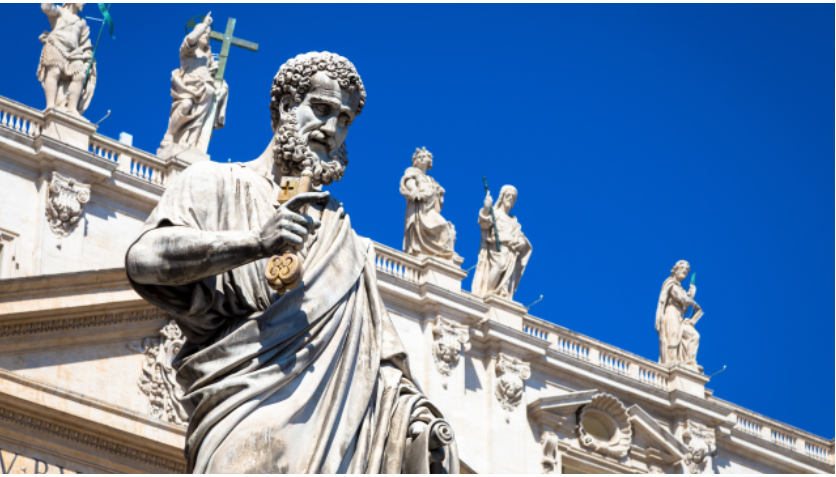In a response addressed to a Brazilian bishop, the Dicastery for the Doctrine of the Faith (DDF) returns to several sensitive points linked to the place of transsexual and homosexual people in the Church. Explanations.
Discreetly published on November 8, a note from the dicastery for the Doctrine of the Faith returns to several sensitive points linked to the place of transsexual and homosexual people in the Church. Signed on October 31 by Pope Francis, it responds to a letter dated July 14 addressed to the Vatican by Mgr. José Negri, bishop of Santo Amaro, regarding “certain questions relating to the possible participation in the sacraments of baptism and marriage of the share of transsexual people and homo-affective people”.
Led by Mgr Victor Manuel Fernandez, the document seems to demonstrate a certain openness regarding these situations. He recalls the speech given so far by Pope Francis, who affirmed from his first apostolic exhortation that “the Church is not a customs house” and that “the doors of the sacraments should not be closed for any reason “. Questioned by I.Media, Mgr Philippe Bordeyne, president of the Pontifical John Paul II Institute for the Sciences of the Family and Marriage, explains the main points of this note in order to clarify the Vatican’s position.
1 ON THE BAPTISM OF TRANSSEXUALS
In its note, the dicastery for the Doctrine of the Faith declares that “a transsexual – even having undergone hormonal treatment and sexual reassignment surgery – can receive baptism, under the same conditions as other faithful, if there are no situations which risk generating a public scandal or disorienting the faithful. »
“This response is opposed to the pastoral attitude which consists of presupposing that the transsexual person would always in this case be in a situation of serious sin preventing them from receiving grace,” believes Mgr Philippe Bordeyne. Two arguments must be taken into account, according to the prelate. “On the one hand, even if there is an objective situation of sin, the subject is not always totally responsible for it.” On the other hand, “even if his personal responsibility were to prevent him from receiving the grace of God (sanctifying grace) in the celebration of the sacrament, it would remain alive in the baptized person”. He specifies that “if the obstacles to grace were to disappear through a work of conversion, the sacrament could then be fully deployed”.
2 ON THE RESPONSIBILITY OF SPONSORING A TRANSSEXUAL PERSON
As for transsexual people wishing to become baptism godparents, or marriage witnesses, the Dicastery for the Doctrine of the Faith considers this opportunity acceptable. However, recalls Mgr Bordeyne, this opinion is not without nuance or limit. “As this task does not constitute a right, pastoral prudence requires that it not be authorized if there is a risk of scandal, undue legitimization or disorientation in the educational sphere of the ecclesial community,” notes he.
3 ON THE RESPONSIBILITY OF SPONSORING A HOMOSEXUAL PERSON
A principle of “pastoral prudence” is proposed concerning the function of baptismal godfather or godmother entrusted to homosexual people living as a couple.
“The text invites us to specifically exclude those who openly campaign for the assimilation of their union to marriage, but it does not close the door for others,” explains Mgr Bordeyne. “It is the same principle as in a recent instruction on the blessing of homosexual people: avoid any confusion or assimilation to marriage”, further specifies the French priest, alluding to the response of Pope Francis to the “dubia” of five conservative cardinals , published at the beginning of October, before the opening of the synodal assembly.
Furthermore, the DDF note “reminds us that it is better to use the function of witness at baptism when doubts are established about the godfather’s ability to transmit the faith,” explains Mgr Bordeyne. In this case, it will be necessary to take into account “the possibility that another person in the family circle can act as guarantor of the correct transmission of the Catholic faith to the baptized person”.
4 ON THE BAPTISM OF CHILDREN BORN FROM SURROGACY
In its note, the dicastery for the Doctrine of the Faith explains that children and adolescents who have started or completed a gender transition will be able to receive baptism “if they are well prepared and willing”. Children born through surrogacy can do just as much, as can those adopted by a homosexual couple. There must, however, “be the well-founded hope that he will be educated in the Catholic religion.” The underlying idea remains not to deprive these children of the grace of baptism, caught in situations for which they are in no way responsible, and to invite their parents to a journey of conversion, notes Mgr Bordeyne.
5 ON THE POSSIBILITY OF A TRANSSEXUAL OR HOMOSEXUAL PERSON BEING A WITNESS TO A MARRIAGE
The note published by the dicastery indicates that nothing in universal canonical legislation a priori prevents a transsexual and/or homosexual person from being a witness at a marriage.
For Mgr Bordeyne, the Vatican’s response to all of these questions “uses very classic (scholastic) reasoning”, while applying them to new cases. “The Church has never stopped doing this to answer new questions, which could not be asked before. »
